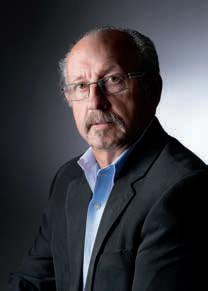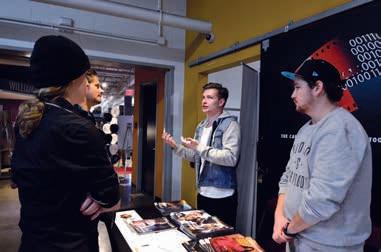
6 minute read
In the News
FROM THE PRESIDENT
George A. Willis csc, sasc
Irecently returned from Belgium, where the IMAGO conference (IAGA) and Awards Gala was to be held in Brussels in March. Just a reminder, IMAGO (International Federation of Cinematographers) is an organization of which the CSC is a full member. Each year, 54 societies from around the world gather in a (host) country to attend the conference, followed by the IMAGO Awards Gala. This year the host society was the SBC (Belgian Society of Cinematographers). Usually, two days are devoted to the IAGA conference, where a substantial agenda is tabled to deal with issues that relate to the various cinematographic societies from around the world who are members of IMAGO. The first day (in this case, the only day) began in the usual way, with delegates attending from around the world ready to address the many issues associated with international filmmaking. This IAGA agenda called for, amongst other items, the election of a new president, revised statutes, financials and various specialist committee reports such as authorship, inclusiveness, education, technical and working conditions, as well as a host of other topics that are all part of conferences in general. It was not too far into the first day – about two hours – when the first reports related to COVID-19 started coming in and then everything went sideways, as the saying goes. The most important announcements related to travel, border closures and the like. Of course, this was something akin to a small spark being fanned into a huge fire. While most of the society delegates are from Europe, there were many from other parts of the world including us, from Canada. Quite apart from the realization that major changes were in the works, the fact was that due to issues completely beyond control, the IMAGO Awards Gala was also being cancelled. This in itself was a major blow to the host society (SBC) because the resulting changes would mean severe financial consequences. All the delegates representing their societies, including the CSC, had to make immediate decisions regarding travel arrangements. Reluctantly, we had to accept this situation but were very surprised when the President of IMAGO suddenly explained that he had to leave for the airport immediately. He was now booked on the last flight out of Brussels, as the airport in his home country was shutting down. In reality, having revised travel itineraries many times before for different reasons, this did not seem to offer too much other than inconvenience for us all, but this opened up a new learning curve. Attempting to do what in another circumstance is merely a formality, took on a very different challenge. Communication with airlines via telephone or online was met with frustration and ineffectiveness. This necessitated a specific trip to the airport to change flight details so that we could be assured of getting a flight back home. While extremely disappointing and frustrating, there was at least the confirmation, reassurance and relief that we would not be in a situation where we would be unable to return home. This was indeed a possibility, as various international airports and borders were being closed. We did not take this turn of events at all lightly because of the unknown factors. On the morning of our departure, all restaurants, bars, etc., were closed, and had we decided to stay after the IAGA to visit other cities in Belgium, as was our original intention, we would no doubt have had to deal with a lot more than inconvenience. The quote from Irish novelist Oliver Goldsmith, “He who fights and runs away, lives to fight another day,” now has a very significant meaning.

Broadcasting & Telecommunications Panel Report Proposes Changes to Funding System
In late January, the federal Broadcasting & Telecommunications Legislative Review Panel (BTLRP) released Canada’s Communications Future: Time to Act, its final report and recommendations to government. Created in June 2018, by the Ministers of Innovation, Science and Economic Development Canada and Canadian Heritage, the six-member panel reviewed Canada’s decades-old Broadcasting, Telecommunications and Radiocommunication Acts and made recommendations for modernizing the legislation and regulatory framework. The report contains 97 specific recommendations touching on four themes: reducing barriers to access by all Canadians to advanced telecommunications networks; supporting the creation, production and discoverability of Canadian content; improving the rights of the digital consumer; and renewing the institutional framework for the communications sector. Directors Guild of Canada hailed the findings urging that global streaming services operating in Canada be brought immediately under the Broadcasting Act and required to contribute to the creation of original Canadian programming. The DGC also congratulated the recommendations to expand the mandate of the CRTC and require that dramatic and documentary productions made with public funds (or moneys contributed to Certified Independent Production Funds) be required to engage Canadian creators in all key creative roles. The full report is available on the Government of Canada website at canada.ca.
Alberta-Raised Cinematographer Douglas Knapp Dies at 70
Courtesy of Douglas Knapp Facebook page.


Veteran American cinematographer and camera operator Douglas Knapp, who worked on the series Murphy Brown, two Star Trek series, as well as the films of John Carpenter and Tim Burton, died on February 3 at the age of 70. Knapp was born in Tulsa, Oklahoma, but raised in Calgary where he attended Western Canada High School. He graduated from the University of Southern California School of Cinematic Arts in 1972, and two years later, shot Carpenter’s feature debut Dark Star (1974). He went on to shoot Carpenter’s followup, Assault on Precinct 13 (1976) and was camera operator on Escape From New York (1981). He also served as camera operator on Burton’s Frankenweenie (1984) and Beetlejuice (1988), as well as on the films Coming to America (1988), National Lampoon’s Christmas Vacation (1989) and Driving Miss Daisy (1992). He taught cinematography at the Los Angeles Film School and West Los Angeles College.
William F. White International Adds TorontoArea Studio Space
William F. White International recently announced plans to increase its studio operation in the Greater Toronto Area, with the addition of 181,000 square feet of new space in Mississauga. The company’s second GTA location, Whites Studios Cantay, will include four sound stages, as well as office space, two carpentry shops, two paint shops, two wardrobe areas and a lunchroom. It is slated to be open for business by early 2021.
AFC Announces Registration for Charity Golf Tournament
Registration is now open for The AFC’s Big Swing Charity Golf Tournament. The annual tournament brings together members of the entertainment industry for a day of golf in support of the work of The AFC – the lifeline for Canada’s entertainment industry. This year’s tournament, co-presented by The AFC and DGC Ontario, will take place on Monday, June 22 at the Royal Ontario Golf Club in Halton. It will have a 6:30 a.m. shotgun start and end at approximately 4:00 p.m. More information is available at afchelps.ca/participate/big-swing-2020-registration.
Nicolas Bolduc csc (cinematographer) La Belle Époque (feature) nominated: Best Cinematography, César Award, Paris, February 28, 2020
FebruaryFREEZE 19 th Annual
William F. White, February 4 and 5, Toronto
Photos by Ernie Kestler
Christina Ienna and Owen Deveney.


Christina Ienna and Owen Deveney.
Martin Wojtunik, Christina Ienna and Owen Deveney.


Rod Crombie answering inquiries on CSC workshops.




